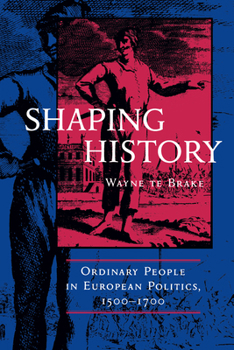Shaping History: Ordinary People in European Politics
Select Format
Select Condition 
Book Overview
As long as there have been governments, ordinary people have been acting in a variety of often informal or extralegal ways to influence the rulers who claimed authority over them. Shaping History shows how ordinary people broke down the institutional and cultural barriers that separated elite from popular politics in sixteenth- and seventeenth-century Europe and entered fully into the historical process of European state formation. Wayne te Brake's...
Format:Paperback
Language:English
ISBN:0520213181
ISBN13:9780520213180
Release Date:July 1998
Publisher:University of California Press
Length:237 Pages
Weight:0.80 lbs.
Dimensions:0.6" x 6.0" x 9.0"
Customer Reviews
1 rating
How Ordinary People Create Prosperous Societies
Published by Thriftbooks.com User , 17 years ago
This is one of the best books I have read on early-modern European history. It wisely avoids the elite-centered accounts of the big events and big names of history that for the most part did more harm than good to their nations. Instead the author details the micro-economic impact of ordinary people in these two pivotal centuries--a time when the efforts of ordinary entrepreneurs developed the institutional mechanisms that allowed both political freedom and economic prosperity to flourish. Most popular recent history books attempt to point to a specific time or place when the West pulled ahead of the Rest. And they usually attempt to "discover" a particular catalyst that rendered that point in time a Major Historical Divergence. But Western history, properly understood, unfolded as an ongoing political process, with progress occasionally flooding forward and then ebbing backward in recurring patterns of change. The author charts these historical patterns throughout the two centuries he concentrates on--the period that witnessed the end of the Renaissance, the turmoil of the Protestant Reformation, and the beginnings of the Industrial Revolution. He desribes where, when and how the ordinary people of this period broke down their political and religious leaders' exclusive claims to authority and thereby opened the door for economic and political freedom. It is a refreshing and exciting account of how the Davids slew the Goliaths. It is notable that progress was never widespread, but occurred briefly, if at all, in only a few locales. This understanding of how history was shaped has been applied to world history in COMMON GENIUS: Guts, Grit, and Common Sense: How Ordinary People Create Prosperous Societies and How Intellectuals Make Them CollapseThere the lessons of history indicate that what Te Brake argues for the two centuries from 1500-1700 has always been true--since mankind first gathered into large orgnized groups. The elites at the top have never voluntarily given up power to those beneath them, nor have they ever removed restictive policies unless forced to do so. Those rare innovative regions where freedom was attained were usually located at the edges of empires, in overlooked spots where there was the least oppression of the common people. Thus, Te Brake concentrates coverage where major advances were made--in Holland in the late 1500's where the people began the process of freeing themselves from Royal authority, in parts of Germany such as the independent Hanseatic cities bordering the North Sea from Holland to Russia,and in the ongoing Republican example of Switzerland governed by local representative assemblies. The book also details the period in the early 1600's when reformists struggled in England and Scotland to limit the power of the King. The wave of revolt that spanned that half century is well covered and illustrates the huge obstacle of aristocratic tradition and absolute monarchical power that had to be cleared a





